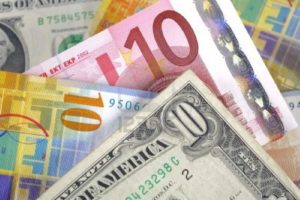 The euro edged lower against the US dollar on Tuesday, as the Zentrum für Europäische Wirtschaftsforschung (ZEW) released mixed data regarding economic sentiment and current situation in Germany and the Euro zone as a whole.
The euro edged lower against the US dollar on Tuesday, as the Zentrum für Europäische Wirtschaftsforschung (ZEW) released mixed data regarding economic sentiment and current situation in Germany and the Euro zone as a whole.
EUR/USD reached a session low at 1.3488 at 12:07 GMT, after which consolidation followed at 1.3495, losing 0.08% for the day. Support was likely to be found at November 18th low, 1.3475, while resistance was to be seen at November 6th high, 1.3548.
The ZEW institute reported that German index of economic sentiment, reflecting the difference between optimistic and pessimistic respondents in a survey over nations development in the next six months, advanced to its highest point since October 2009. The index reached a value of 54.6 in November, after a month ago it stood at 52.8, while preliminary estimates pointed an advance to 54.0. The same indicator for the whole Euro region demonstrated a climb to a reading of 60.2 in November from 59.1 in October, but remained below expectations of a larger advance, to 63.1 in November. Slightly improving economic outlook for the Euro zone probably also caused a positive impact upon German result, according to ZEW.
On the other hand, the index, gauging current situation in Germany, showed a retreat to 28.7 in November from 29.7 a month ago and confounded projections of an advance to 30.9. Current economic conditions in the bloc slightly worsened, as the corresponding index fell to a value of -61.6 in November from -60.9 in October.
At the same time, the Organization for Economic Co-operation and Development (OECD) revised down its forecast for global economic growth in 2014 to 3.6% from 4.0%, as projected in May, and also warned that the outlook for emerging markets was deteriorating. Global economy probably expanded 2.7% this year, also a revision down from a 3.1% growth, as forecast in May.
“Most of the emerging economies have underlying fragilities that mean they cannot continue growing as they used to,” OECD Chief Economist Pier Carlo Padoan said in an interview, cited by Bloomberg News. “They used to be an important support engine for global growth in bad times. Now the reverse is true and advanced economies can’t be said to be in very good times again.”
Earlier on Tuesday European Central Bank board member Jörg Asmussen said that the bank had more instruments at its disposal in order to struggle with potential risks, regarding diminished price stability. What he referred to was imposing negative interest rates on bank deposits, in case the situation with inflation rate requires it, but he added that such a tool should be used with wariness.
Asmussen comments came one day after another European Central Bank’s board member, Ewald Nowotny stated, that economic conditions in the Euro bloc have begun to improve, but yet, at a slower pace than projections, as the current rate of inflation remains below ECB’s objective of 2%, which is considered as providing price stability.
Meanwhile, market players used caution making decisions before the release of the minutes of Federal Reserve Banks most recent meeting on policy, scheduled on Wednesday. Experts project that the Federal Reserve will postpone the scale back of its asset purchases until March next year, even following the report, which showed that non-farm payrolls in the United States rose more than expected in October. Policymakers will probably reduce the monthly pace of stimulus to 70 billion USD at their policy meeting on March 18th-19th from the current pace of 85 billion USD, according to the median estimate of 32 economists in a survey.
Elsewhere, the euro was higher against the pound, with EUR/GBP cross gaining 0.13% on a daily basis to trade at 0.8397 at 12:47 GMT. EUR/JPY pair, on the other hand, was losing 0.16% to trade at 134.85 at 12:47 GMT.





